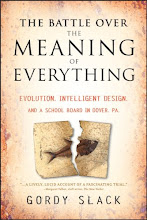Brains are everywhere this month (the covers of SciAm and WIRED), and so is their hottest new commentator, David Eagleman. He was profiled in a long and riveting New Yorker feature, he has a controversial piece about brains and the law in The Atlantic that is an excerpt from his new book, Incognito: The Secret Lives of the Brain, and his bestselling fictional collection of "thought experiments," Sum: Forty Tales From the Afterlives is preparing to take the stage as an opera in London. The young, excitable and handsome Baylor University assistant professor makes brain science look sexy and fun. And he knows it.
"There are an infinite number of boring things to do in science," he told New Yorker writer Burkard Bilger. "But we live these short life spans. Why not do the coolest thing in the world?" That, of course, is to study brains!
While his new book examines the role of the unconscious, the New Yorker piece looks at his research on the brain's various timekeeping mechanisms (this work involves, among other things, scaring subjects nearly to death by dropping them from great heights and studying Brian Eno's brain while he plays the drums), but he also specializes in synesthesia (his book about synesthesia, Wednesday is Indigo Blue, came out in 2009), neuroplasticity (his book LiveWired: How the Brain Reconfigures Itself will be out next year,) predicting the future of everything (his book Why the Net Matters: How the Internet Will Save Civilization was published in 2009), and, on the side, the mind-body problem.
The Atlantic excerpt argues for taking a more neuroscience-focused approach to criminal justice. "When a criminal stands in front of the judge's bench today, the legal system wants to know whether he is blameworthy," Eagleman writes. "I submit that this is the wrong question. The choices we make are inseparably yoked to our neural circuitry, and therefore we have no meaningful way to tease the two apart. The more we learn, the more the seemingly simple concept of blameworthiness becomes complicated, and the more the foundations of our legal system are strained."
As brain science gains traction, he argues, more and more criminal behavior will be seen as pathological, not reprehensible. This is an old argument, to be sure, but with some new twists. Polymath Eagleman and his colleagues are developing a kind of neurofeedback device that they hope will help offenders to gain control of their impulses and just say no to drugs, burglary, assault, and sexual abuse. It's brain training for criminals.
Eagleman embodies what is fascinating, fun, and hopeful, about modern neuroscience. He also reflects what is a little scary and naive about it; a belief that, as he says, "we are our brains" and that our problems are essentially brain problems that can be addressed and solved as such. At 40, he has decades still to mature and deepen, and I have no doubt he will. So watch this guy. (Actually, you can watch him right here talking about "Reality and its Future" at a TEDx lecture. Or right here, where he is talking to PopTech about Possibilianism.... Oh, didn't I mention that Eagleman is also the figurehead of a new quasi-serious (a)religious movement based on his observation that "we know way too little to commit to a position of strict atheism, but we know way too much to commit to any particular religious story."
Subscribe to:
Post Comments (Atom)



1 comment:
You follow i follow, Visite me back,
alva-net.blogspot.com
Post a Comment